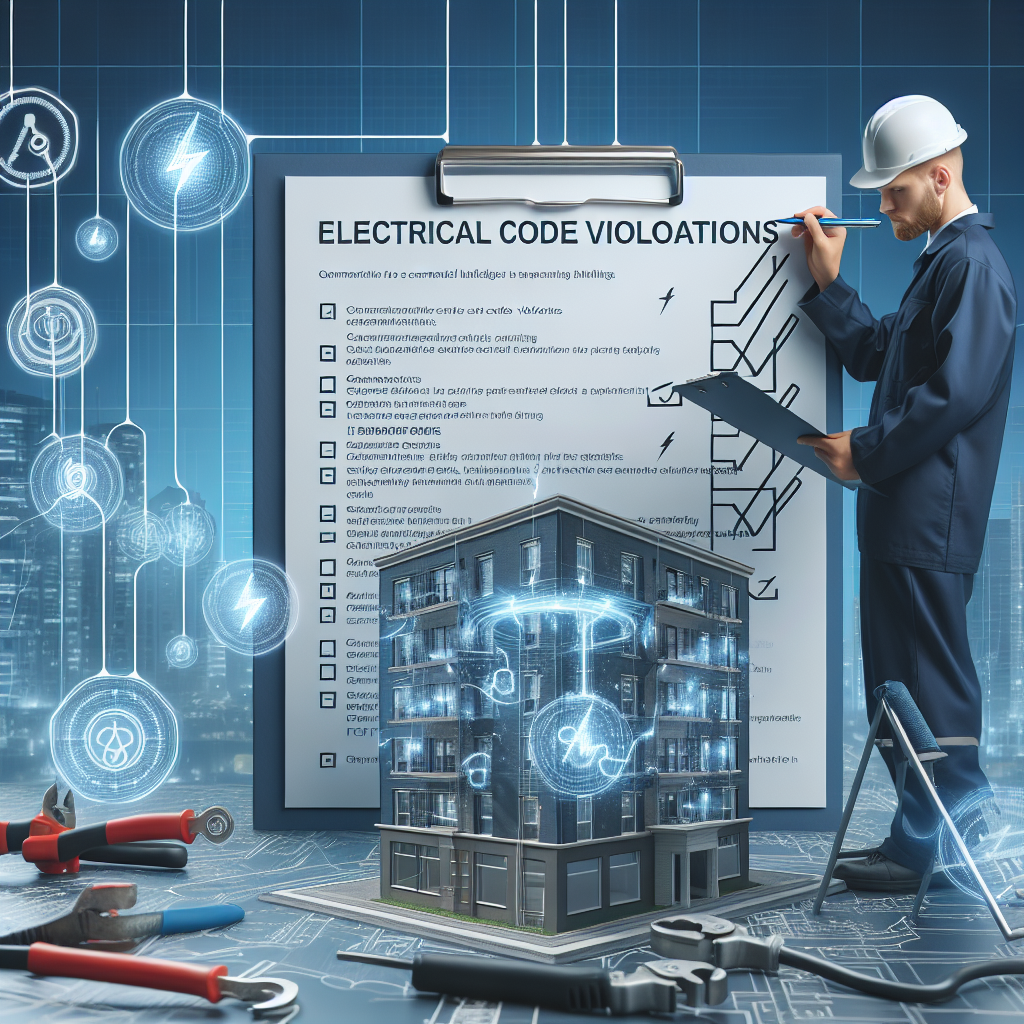Electrical code violations are a significant concern for business owners and property managers, as they can lead to severe safety hazards, costly fines, and increased insurance premiums. In commercial buildings System, ensuring that electrical systems meet the proper codes and standards is crucial to maintain a safe and efficient environment. In this blog, we will discuss how to identify and address electrical code violations in commercial buildings System, providing you with essential insights on how to keep your property compliant and safe.
What Are Electrical Code Violations?
Electrical code violations occur when the electrical systems in a building do not meet the required standards set forth by local, state, or national electrical codes. These codes are designed to ensure safety, efficiency, and sustainability in the installation, maintenance, and operation of electrical systems. The National Electrical Code (NEC) is the most widely adopted set of standards in the U.S. and serves as the benchmark for compliance.
Electrical code violations can range from minor issues like improperly installed outlets to more serious concerns like faulty wiring or outdated electrical panels. If not addressed promptly, these violations can lead to equipment failures, electrical fires, or even electrocution.
How to Identify Electrical Code Violations
Identifying electrical code violations can be challenging without professional knowledge, but several common signs can indicate that an electrical system may be non-compliant. Here are a few steps you can take to identify potential issues:
1. Hire a Qualified Commercial Electrician
The best way to identify electrical code violations is to hire a qualified commercial electrician who is familiar with the NEC and local building codes. Professional electricians can conduct thorough inspections and identify hidden problems in your electrical system.
2. Check for Outdated or Damaged Electrical Panels
One of the most common sources of electrical code violations is outdated or damaged electrical panels. If the electrical panel is old, it may not be capable of handling the demands of modern equipment or may lack essential safety features like circuit breakers.
3. Look for Exposed or Unprotected Wiring
Exposed or unprotected wiring is a major safety hazard and a clear sign of non-compliance with electrical codes. If wiring is not properly insulated or enclosed, it can lead to short circuits, electrical fires, or electrical shock.
4. Improper Outlet Installations
Another common violation is improperly installed electrical outlets, which can lead to electrical shorts or electrocution. Ensure that outlets are grounded, secured, and spaced according to code requirements.
5. Inadequate Grounding
Electrical systems that lack proper grounding are not only dangerous but also violate electrical codes. Grounding ensures that electrical currents are safely directed away from equipment and people in the event of a malfunction.
6. Check for Overloaded Circuits
If your commercial space is using an excessive number of devices on a single circuit, it could lead to overheating, equipment damage, or fire risks. Circuit breakers are installed to prevent this, but you may have a violation if circuits are frequently tripping or overloaded.
How to Address Electrical Code Violations
Once you’ve identified the potential electrical code violations in your commercial buildings System, it’s time to take corrective action. Here are some steps to address these issues:
1. Consult an Experienced Commercial Electrical Contractor
Once you have an understanding of where the issues are, it’s crucial to consult with an experienced commercial electrical contractor who can help you resolve the violations. These professionals have the expertise to bring your building’s electrical systems into full compliance with local codes and regulations.
2. Upgrade or Replace Outdated Equipment
If your electrical panels, outlets, or wiring are outdated, it’s important to upgrade them to meet modern safety standards. Upgrading electrical panels is often necessary when your commercial buildings system has added new equipment or appliances that require additional power.
3. Install Arc Fault Circuit Interrupters (AFCIs)
One common violation in older commercial buildings System is the lack of arc fault circuit interrupters. AFCIs protect against electrical fires caused by arcing, which can occur when electrical wires wear out or become damaged. Installing AFCIs in your building can help meet code compliance and enhance safety.
4. Rewire or Replace Faulty Wiring
If your wiring is outdated or damaged, it may need to be replaced. Faulty or exposed wiring is a major code violation, and you should immediately address it with the help of a licensed commercial electrician. This will reduce the risk of electrical fires and ensure your systems are up to code.
5. Ensure Proper Grounding
To meet electrical code requirements, make sure that all electrical systems are properly grounded. This includes verifying that all outlets are grounded and checking for proper grounding of larger equipment and machines in your facility.
6. Install Ground Fault Circuit Interrupters (GFCIs)
In areas where water or moisture is present, such as kitchens or bathrooms, GFCI outlets are required by code. These outlets automatically shut off power when they detect a ground fault, reducing the risk of electrical shock.
7. Ensure Adequate Circuit Breaker Protection
In some cases, the issue may be inadequate circuit breaker protection. Ensure that each circuit is protected by a breaker of the correct size. Overloaded circuits can lead to overheating, which may cause fire hazards. Make sure that your breakers are not only correctly sized but also in good working order.
Conclusion
Electrical code violations in commercial buildings System is not something to take lightly. These violations can lead to dangerous situations, costly fines, and damage to your reputation as a business owner. By hiring a professional commercial electrician to regularly inspect your electrical systems, you can ensure that any violations are identified and addressed before they become a serious issue. Maintaining code compliance not only promotes the safety of your employees and customers but also protects your business from unexpected costs related to electrical failures.
Stay proactive about electrical safety, and make sure that your commercial building remains up to code by addressing any issues as soon as they arise.









